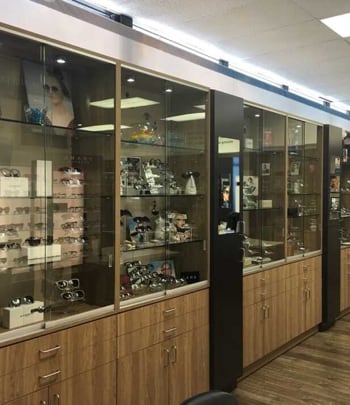Balancing Your Eye Health & Overall Health
At Dr. Goldstone Vision Center in Fountain Valley, we understand the deep, complex relationship your eyes share with the rest of your body.
Several health conditions can affect your eye health, increasing the risk of various eye diseases and conditions like glaucoma, cataracts, and dry eye. One of the most common health problems in America is diabetes, which affects more than one third of our entire country’s population.
If you have diabetes, we recommend having regular eye exams to detect potential issues before they affect your sight. You can start preserving your vision by booking an appointment at either of our locations today.
If You Have Diabetes, Eye Exams Are Essential
Diabetes is important to manage because it can raise your blood sugar and increase the risk of developing several health problems, including a few that affect your eyes.
Your body uses sugar, also known as glucose, as a source of energy. And insulin, a hormone produced by your pancreas, is essential for transporting sugar into your blood cells. However, diabetes can affect this process in a number of ways, leading to higher blood sugar.
Symptoms of diabetes include fatigue, increased thirst and hunger, blurry vision, and increased risk for infections, diseases, and conditions.
When your blood sugar rises, it can damage the blood vessels in your eyes, increasing the risk of developing an eye disease. Our medically-focused approach to eye care can help detect these problems early in their development, allowing us to help you preserve your sight.


How Diabetes Affects Your Eyes
With the support of Total Vision behind us, we have access to various tools, techniques, and technologies that could help us detect early signs of diabetes-related eye diseases and conditions.
We observe several parts of your eyes to determine your risk of developing an eye disease, including your macula, retina, optic nerve, intraocular pressure, and crystalline lens. Here are some of the most common diseases diabetes may cause, each of which we look for during your comprehensive eye exam.
Diabetic Retinopathy
Diabetic retinopathy is an eye disease directly related to diabetes.
When your blood sugar levels rise, it can affect the blood vessels inside your retina. Over time, these vessels may begin to bulge, break, and leak fluid, damaging your retina and leading to non-proliferative diabetic retinopathy. Non-proliferative diabetic retinopathy develops slowly, and you might not notice symptoms for years, but over time it could lead to vision loss.
Advanced cases, called proliferative diabetic retinopathy, develop when your retina attempts to mitigate fluid loss by growing abnormal blood vessels. However, these vessels are also quite delicate and can break easily. In time, these blood vessels may create scar tissue on your retina and increase the risk of retinal detachment.
Diabetic Macular Edema
Diabetic macular edema is another diabetes-related eye disease that can develop as a result of diabetic retinopathy.
As your retina leaks fluids from damaged blood vessels, these fluids can accumulate and cause your macula to swell. The macula provides the clear central vision you use to see fine details, but diabetic macular edema can affect this ability and possibly lead to permanent vision problems.
Open-Angle Glaucoma
Open-angle glaucoma is the most common form of glaucoma, and diabetes could double your risk of developing it.
Open-angle glaucoma damages a part of your eye called the optic nerve, which is responsible for sending information collected by your retina to your brain. Diabetes can contribute to your intraocular pressure (IOP) levels, which may damage your optic nerve over time.
Learn more about glaucoma by visiting our Eye Disease Diagnosis & Management page.
Cataracts
Cataracts are a common age-related eye condition. However, diabetes could increase the risk of developing cataracts earlier in life.
Cataracts develop when proteins in your eye’s lens break down over time, but diabetes could increase the level of glucose in your eye, which can affect enzymes and proteins in the lens and cause a cataract.
Preserve Your Vision
Several health conditions can affect your eyes, but regular eye exams could help preserve your vision throughout your life. Contact us today to book your appointment!
Visit Us Today

Visit us
Only 10 minutes down the road from Huntington Beach, you can find our practice in Magnolia Plaza, near Savers.
- 9107 Garfield Ave
- Fountain Valley, CA 92708
Hours of Operation
- Monday: 9:00 AM – 6:00 PM
- Tuesday: 9:00 AM – 6:00 PM
- Wednesday: 9:00 AM – 6:00 PM
- Thursday: 9:00 AM – 6:00 PM
- Friday: 9:00 AM – 6:00 PM
- Saturday: Closed
- Sunday: Closed


Our Brands




Our Google Reviews
Be the First to Know,
Be the First to Win.
From eye health insights to exclusive giveaways, your feed just got a lot clearer.








